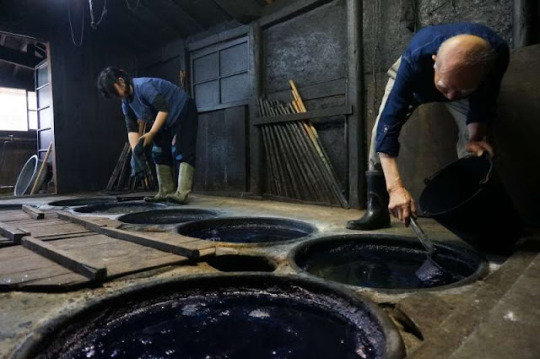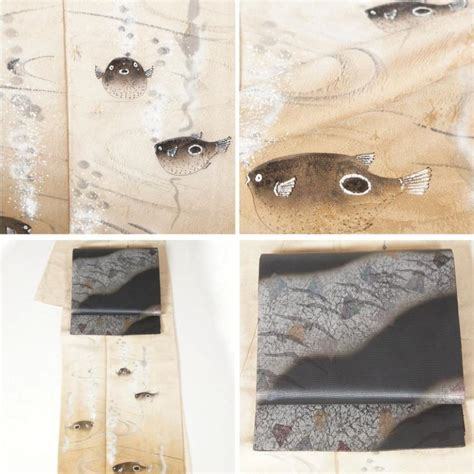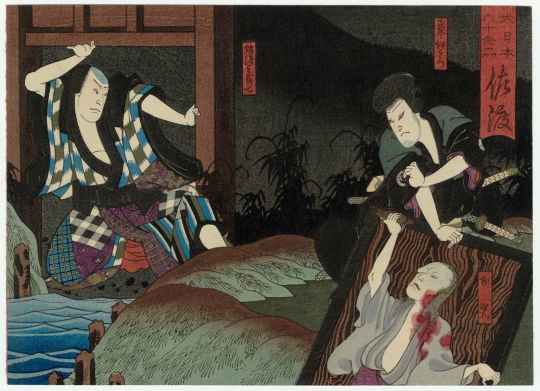#mordanting
Explore tagged Tumblr posts
Text
Fiber shenanigans afoot. Dyeing demo this weekend. Man am I happy plans got cancelled this evening.



5 notes
·
View notes
Text
Mordanting wool for natural dyeing for the first time🤩


Think I did it correctly(??) Thou I suppose we'll see once I finally get around to dyeing the skeins later. They did all become much more grey so that's probably a good sign (the light one was complete white before I started, the more grey ones are darker too)
#natural dye#mordanting#I used ash. is supposed to give the dye a darker colour (and the only one I have easy access to of the options in the book I have)#(and one of the non toxic options from the book)#looks like Bertha the yarn might be gaining some little siblings#Bertha the yarn
0 notes
Text
@historically-accurate from here
Antonio was watching the two of them very carefully. They were doing their usual thing of accusing him of not being a real man, which he tolerated.
"They are, aren't they?" Antonio confirmed.
However, it was when they started making comments about how Percival was dressed (and how stupid he looked) that Antonio's jaw seemed to tighten.
Especially with the fact that they did seem to be looking to beat on someone, if their body language was anything to go by.
"Leave them to me," he only said then.
#historically-accurate#Mordant Mesmerist | Antonio#((I hope it was okay to move this to a new post for easier trimming))
20 notes
·
View notes
Text
What if it's been 3 years since I made Haven and I don't want her to be green anymore.
#gw2 norn#playing with expanding her gold imagery#giving her so much hades energy#possessed by the idea of her having a skeleton of gold#what if i made her eyes like molten gold#what if i gave her gold accents#what if i made her colors more like the earth#what if her necromancy was black and tar-like and gold#what if she used the mordant weapons#what if i want her to look and be more original than just oh shes green bc necromancer#what if i hate what green and red look like together
13 notes
·
View notes
Note
my mother has asked me to ask “that weaver friend of yours” lol — do you have experience dyeing linen? what does the process look like for natural vs synthetic dyes?
happy to be that weaver friend of yours 🥰❤️ dyeing linen is basically the same as dyeing cotton or any other cellulose fiber, so any synthetic dye that works for cotton will also work for linen. a professional grade fiber reactive dye like procion mx or dharma's procion (here) dyes cellulose fiber without heat, and the process is quick and painless. it just involves a large bucket, water, the dye powder and the cloth you wish to dye. i have little experience with rit dye so i'm not sure if you'd need heat for that, but procion dye is higher quality, comes in a lot more colours than rit, and a 2oz container is like $2 usd and goes a long way
the natural dye process for linen takes a lot longer than the procion dye process and requires several steps. cellulose fibers really don't like to take dyes so you basically have to do a bunch of alchemy to convince it to do what you want (compared to protein fibers like wool and silk which love dyes and only need some gentle nudges)
naturally dyeing linen depends on the dye you'd wish to use, but the process is essentially: scouring, mordanting, and dyeing. it's really important that you scour linen especially because it contains a lot of pectins that prevent dye from penetrating the fiber, so a harsh scouring is best (ie. washing it with hot water and ph neutral soap, even to the point of boiling the cloth. linen can take a lot of heat and is better for it, cotton is more sensitive) you'll probably have to do this before dyeing it with the synthetic dye too for best results
most natural dyes require that you mordant the cloth before dyeing. some dyes don't require a mordant (indigo is the big one, but if you're working with onion skins or other materials that contain tannins this is also true. however mordanting the cloth before dyeing with tannins or even mordanting with tannins is still recommended for better colour performance long-term unless you're working with indigo in which case using a mordant can actually cause problems) but if you're unsure, assume that you need to apply a mordant. you essentially have to simmer the cloth in a hot pot with either a material that contains tannins (tannic acid), a natural bio-accumulator of aluminum (symplocos), or use a metal salt (alum acetate is best for cellulose, but iron and copper salts can also be used. the metal salts route requires more safety precautions esp if you use copper salt, you can't dump that down the drain) your choice of mordant impacts the final colour with different mordants shifting the chemical reaction that happens in the cloth when you dye it
with cotton and linen, after you use the mordant you need to use either a chalk or wheat bran bath to remove excess mordant from the cloth, esp if you use alum acetate, otherwise it can leave a whitish cast over the cloth and also impede dyeing lol. wheat bran baths tend to cause a warmer tone to the final dyed cloth, chalk baths cause a cooler tone. i only use wheat bran baths bc i prefer the warmth and i get the bran cheaply at my local punjabi grocer
only then can you dye the cloth, again unless you're working with a dye like coffee or tea or onion skins OR indigo. linen really doesn't like to take natural dyes unless you do all the above steps, it's stubborn. the dye process itself depends on what dye you use and you can do stuff like solar dyeing if you don't want to simmer it in a pot on a stove. if you plan to go the natural dye route lmk and i can send you some scans of a book i have that contains precise instructions for preparing linen for dyeing
#fun fact the word for mordant in bahasa (both msia and indonesia) is mordan lol#i love when stuff like that happens. like computer in bahasa msia being komputer#as a caveat these are the western steps for natural dyeing there are other approaches that include the same chemical processes#but dif techniques like ex. in malaysia/indonesia mordants and dye baths are fermented for several weeks to months#and the fermentation makes it so they can be used cold and you only have to dip them in the baths rather than simmer#but that takes even longer than the western methods and is less documented in an instructional sense so the western approach is easier
45 notes
·
View notes
Text
Of Souls and Sorcerers (Narrative)
So while we have the thread where Antonio from @blooddrinkingbartender violently stole a large piece of Russell's soul while corrupted (then returned it when the corruption was purged) back in October 2024, I realised I never really wrote down the event from Russell's perspective, so this is a story of that. This is how Russell got the scar on his soul.
Russell had been a little concerned that he didn't have Halloween candy for the trick-or-treaters. While he was dressing up and going to work (leaving a bowl outside his door and a sign for kids who came knocking to take some), he was unsure if there would be enough for any kids who came by to trick or treat at Hidden Gems too.
While it wasn't necessarily an urgent matter yet, he hadn't really been doing anything else since he got off work that day, so he figured a quick trip to the grocery store wouldn't hurt.
So he was casually making his way down the street, although he had started grow wary of a tense energy in the air. He was getting a bit of a hunch that something was wrong, even if he wasn't entirely sure what.
"Russell Tolbert? Is that you?" a familiar voice caught his attention and he turned his head towards it.
His eyes widened.
It was Antonio Lombardi. He worked as an admin in the main city library and also was the remarkable magician Lord Enigma some evenings. He was on the ground, holding his leg, his cane was nowhere in sight.
"I need some help," Antonio said, his voice sounding a little strained, as though trying to talk through pain, "I'm afraid I'm hurt. Could you please lend me a hand?"
Russell immediately started to come forward without a second of hesitance.
"Um, sure, what, what can I..." but then he trailed off as Antonio's arm shot out to grab his left hand in just a second, "What, what are you..."
Antonio looked up to meet Russell's gaze as he then stood, and Russell himself trailing off, unable to tear his eyes away from that abyss of green. Shades that swirled together around the slit pupils, like mixing paint, but they never blended. Russell never had a chance, his thoughts were wiped away as he stared back and his body became rooted to the spot.
A smirk crept across Antonio's lips.
"You are helping now," Antonio then said. His voice echoed through Russell's skull, and Russell felt a pulling feeling in his chest, but then there was a sensation of something stretching to its limit, like a rubber band threatening to snap.
His limbs were growing heavy, and hid skin was growing cold, his chest was hurting, pain pulsing through it with each heartbeat. Vision was swimming, and the edges of his sight were becoming blurry.
"Just let it go..." Antonio only said. In a blink, Russell realised he was staring at some kind of monster that had been in Antonio's place. Its face was overcome by that same swirling green mist that commanded all attention, and it was more of a skeletal feline that stood on two legs.
"Plea-plea-please..." Russell's voice sounded garbled, like he was trying to talk underwater. He tried to move his arm to try and get the other's hand away from his chest, but it wouldn't obey him, "St-stop..."
But then there was a snap from within, and the beast slowly withdrew, holding a glowing blue soccer ball sized lump in its hand. Despite being unable to move, all Russell could feel was a hollow cold ache in the middle of his chest that slowly radiated through the rest of him. The orb trembled violently, as though wanting to get away, but it couldn't.
"Just relax..." the creature's voice sounded like it was comprised of multiple sounds as it held the soul fragment in its clawed hand. Russell's vision was swimming more and his body was falling back. It then absorbed the fragment into its body with one massive inhale through its mouth, "You'll forget about all of this, just like a nightmare that fades as soon as you wake..."
Russell was unconscious before he even hit the ground. Even months later, that command to forget still held strong inside of his mind. All he really remembered were a few vague moments, like a long-forgotten dream. Lucien holding him, feeling cold, falling asleep again.
What had happened? Had it even happened at all? Russell had no idea, and no matter how much he tried to remember, the more it would slip away from him, just like sand falling through your fingers.
Or a nightmare that faded as soon as you awoke.
#Narrative#Adorkable Astrophile | Russell#Mordant Meowsmerist | Antonio#Russell does not remember these events#But he will at some point
7 notes
·
View notes
Note
Hello! I love your blog bc it helps me a lot with writing and crafting. Thank you so much for making it!
Are there any patterns that deal with poison? Either in the pattern or in the dyeing process?
Even if there's not I'm glad you and this blog exist 💗
(anon continues) Poison in the dyeing process, like when green dresses were dyed with copper arsenite and it was extremely deadly.
Or a pattern of someone being poisoned, like a historical/folktale.
_______________________________________
Thank you for your kind words <3 I tried to keep things organized but the subject is huge so my of the top of my head answer is going in many directions. I hope you'll still find what you need :3
I'll briefly cover here dyes and (pigments), poison motifs, real life and supernatural poisonings. Buckle up we've got a long post ahead!
____ ABOUT DYE
Tbh I had to think for a moment because I don't recall major "poison" stories linked to dyes in Japan, be it fictionous or real (yet that doesn't mean none ever happened, especially considering Japan's history of industrial poisonings...).
Most gruesome details in the fabric industries I know of are about the horrific life & work conditions of female laborers in spinning mill manufactures (as in many countries, Japan industrialization process was ghastly...).
If potters and dyers had excellent practical knowledge, chemistry as a science officially started kind of late in Japan as it was not a local interest, and as rangaku (study of Western knowledge) often favored other subjects like medicine or warfare.
So, until the introduction of aniline dyes (not textile related, but this article about the use of synthetic dyes in ukiyoe printing is super interesting), Japanese worked with "natural" dyes, like ai (indigo) which was the most used during Edo period.
As with any ingredient, being natural doesn't equal safety. Some mixtures could be quite potent/foul, and process could be dangerous. Plants and minerals base ingredients could be toxic (cinnabar and orpiments were then used as paint pigments, and lead could be found in make up), as were mordants used to set colors.
If you want to easily overview which ingredients were used to create colors, I recommand browsing [Irocore] which presents colors with explanation in English in their database (pick a color then scroll down).
Not related to poison, but ai (indigo) is traditionally prepared in aigame/enormous floor set jars I find utterly terrifying:

I don't know if this tidbit can help you, but some dyes and mordants actually damage the fabric overtime, leaving them brittle (silk desintegrates after a while which is a huge issue in textile conservation).
____ POISON MOTIFS
Concerning "poison" themed patterns, none would be actually used traditionally on a kimono or an obi beside novelty items ^^;
For example, many plants can be toxic, but I don't see them set as pattern for this property - they'd rather refer to a poem, be a symbol of the passing of seasons etc. Fuji (wisteria) can be quite harmful, yet it's a beloved traditional motif in Japan.
You have much more chances to find pattern with kujaku (peacock) which are thought to be impervious to poison in Buddhism, than say venomous mukade (centipede) or the horrific ômukade (a youkai I covered in a folktale).
Snakes like the habu and mamushi are dangerous, but if used as pattern snakes are most often auspicious and linked to rain dragons or goddess Benzaiten.
If you squint hard, toxic fugu could count as poison pattern, but such a seasonal delicacy as a motif would mostly underline wealth (as those fishes are pretty expensive as they are prepared by specialized chefs), a kind of carpe diem spirit, or just a fun pattern because fugu balloon shape is cute ;)

____ POISON MURDERS
Poisoning was certainly a thing is Japan since ancient times (see kodoku sorcery). Poisons were for example used in some fishing techniques.
I am pretty sure some kuge and buke were disposed of this way - even thought poison was seen as a coward weapon (hence why its supposed to be only used by shinobi/ninja - even if this "fact" is opened to a lot of discussions!).
During Edo period, such murders made up the news and penny dreadful-like illustrated books favored by city dwellers in need of a fright. But those stories didn't pass to posterity beside cheap ukiyoe plates, and were never as popular as some shinjû (double suicides) or ghost revenges like poor poisoned and murdered Oiwa's:

____ SUPERNATURAL POISONINGS
If your poison is both physical and metaphorical illbeing, mushi could be your guys ^^ This term actually covers everything small and crawling, from real worms and insects, to anything inside one's body causing distress - be it a parasite, an unknown illness, an overboard emotion, a curse etc. If you've read/seen Mushishi you've got what I mean:

In fact any illness-causing being could count as poison-bringer. Hôsôkami (smallpox demon) was truly feared by all before vaccination was introduced in Japan.
Finally, continuing the supernatural poisoning trail, best girl is probably legendary fox witch Tamamo no Mae who among other terrible deeds made emperor Konoe fall sick with poisonous miasma (some version of the story attributes the disease to another monster, the nue). I covered a similar murderous kitsune folktale here.
#ask#japan#japanese history#dye#pattern#motif#poison#venomous#illness#natural dye#aniline dye#mordant#pigment#kujaku#peacock#mukade#centipede#omukade#youkai#snake#hebi#mamushi#habu#benzaiten#fugu#mushi#insect#mushishi#Hôsôkami#smallpox demon
120 notes
·
View notes
Text

this is NOT my screenshot, I found it while looking up the Praise Joko! statue locations in Vabbi so I could go salute them all for the achieve/title. just to be clear. not my screenshot. looks sick as fuuuuck though I've had the tab open for several days to go back and look at it. I just really want to look at it more but if I don't close the tab soon I'll begin to suffer ailments most foul.
by DBKENNY on reddit's GW2 sub from September 2022
#mordant crescent#awakened#sorrryyyyy maybe sharing from reddit is some kind of foe paw.... well i think it looks so cool. so sick. so awesome!
6 notes
·
View notes
Text
Power Rangers fancast
Hypothetical MMPR fancast
Asher Angel as Red Ranger/Jason Lee Scott

Chosen Jacobs as Black Ranger/Zack Taylor

Owen Morgan As Blue Ranger/Billy Cranston

Sophia Lillis as Pink Ranger/Kimberly Hart

Ashley Liao as Yellow Ranger/Trini Kwan

Dallas Liu as Green/White Ranger/Tommy Oliver

Aiden Mincks & Alex Wolff as Bulk & Skull

Paul Walter Hauser as Ernie

Bryan Cranston as Zordon

Keegan-Michael Key as Alpha 5

Haliee Steinfield as Dulcea

Kathryn Hahn as Rita Repulsa

Willem Dafoe as Lord Zedd

Benedict Cumberbatch as Ivan Ooze

Kevin Durand as Goldar

Lucy Liu as Scorpiona

Seth Rogen & Bill Hader as Sqautt & Baboo

Toby Jones as Finster

Hafþór Júlíus Björnsson as Rito Revolto

Clancy Brown as Master Vile

Josh Gad as Mordant

#Power Rangers#Fancasts#Mighty Morphin Power Rangers#Jason Scott Lee#Billy Cranston#Zack Taylor#Trini Kwan#Kimberly Hart#Tommy Oliver#Bulk And Skull#Zordon#Alpha 5#Rita Repulsa#Lord Zedd#Ivan Ooze#Goldar#Scorpiona#Squatt#Baboo#Finster#Rito Revolto#Master Vile#Mordant#Dulcea
7 notes
·
View notes
Text


Havaer Mundy really hates paperwork
#havaer mundy#shards of earth#the final architecture#the final architecture trilogy#mordant house#paperwork
6 notes
·
View notes
Text



do you think even english exorcists can have semi-romantic girl best friends that scare them just a little?
[ok2rb, she/her mi/mim/mimicks for mordant (s/i)]
#selfship art#selfshipping#oc x canon#r: 🚭#< ytay!#mordant#miight give mim a last name AT SOME POINT i'm still working on mim.#art.exe#finished#it literally feels like forever since i've posted smth i like this much. smth for myself at least YAYYYYY!!
32 notes
·
View notes
Text
dyed a braid and a couple handfuls of locks with some of the red onion skin dye and copper mordant, just to see what i’d get, and it’s so pretty, but i have... no way to take pictures
#it's a really nice russet#i also pre-mordanted the braid and left the copper in there for the rest of the time and tossed the locks in with the dye#and got darker colors on the locks. which might just be a breed difference (i don't know the breed of either bc they were mislabeled#by the sellers)#but also is really cementing to me that there's not much point in pre-mordanting with copper#but also ! got all the color out of the dyebath and it pretty much all stuck to the fiber. always satisfying#natural dye#natural dyeing
131 notes
·
View notes
Note
💭 - Which muse of yours do you wish to write more with?
I've been having some fun writing more of Antonio to be honest, now that he's trying to be a bit more social and find more joy in his life again.
And now Bill is complaining in the corner because he thinks the answer should have been him.
#5mind#Want ice with that?#((Thanks for the sending this in))#Frisky Barkeep | Bill#Mordant Mesmerist | Antonio#The Flower Behind the Men | OOC
2 notes
·
View notes
Text
Main cast of said untitled sister show (inspired by Thomas the Tank Engine & co.), made in... *checks notes* ... 2023... damn...






[their sister show, also untitled :D)
Quick facts:
Mordant & Vivayden are brothers (if any facial similarities aren’t obvious)
They all live in a costal region
Said costal region is the same setting as their sister show, but never interacted
#dunno what I call them#lunarfeat's art#original characters#try to guess which character is inspired by :3#taylor#kale#vivayden#mordant#cleve#achilles#it's 1 in the morning and still not tired
4 notes
·
View notes
Text
Private Sector Good, Public Sector Bad? (3)
This is the third part of a look at former public services and utilities in Britain that have been privatised or part-privatised in the name of neoliberal economics and the mistaken belief that private enterprise is ALWAYS more efficient than publicly run bodies.
The National Health Service
The Tory Party and successive Tory governments, including the Sunak administration, vehemently deny they are slowly privatising the NHS.
“Sunak pledges to cut waits with greater healthcare choice but denies NHS privatisation plan." (Health and Protection: 04/01/23)
Such denials are deliberately misleading. According to the World Health Organisation:
“Privatisation is where non-government bodies become increasingly involved in the financing or provision of health care services”.
The Tory Health Care Act of 2012 removed the "duty of government” to provide NHS services directly, opening up NHS care provision to the private sector. This trend has been further accelerated by the 2022 Heath and Care Act. The Guardian had this to say about the change in the law:
“The new bill will continue the dismantling of the NHS, this time by adopting more features from the US health system. For anyone who cares about the NHS, this should set off alarm bells.” (Guardian: 07/12/21)
What we need to remember when reviewing the provision of public services by private companies is that the first duty of a private company is to make profits for it’s shareholders. The profit driven motive of private enterprise may lead to more cost savings but often at the expense of quality of service
“There is only a small number of studies addressing the effect of privatisation on the quality of care offered by health-care providers, and yet within this small group of longitudinal studies, we find a fairly consistent picture. At the very least, health-care privatisation has almost never had a positive effect on the quality of care." (Lancet: "The effect of health-care privatisation on the quality of care”, March 2024
In 2019, (November 29th) the Guardian reported that private firms had received £15bn over a five-year period for NHS provision. By 2019/20 Health Care Commissioners were spending £10bn a year on services delivered by the private sector. (The Kings Fund: Is the NHS being privatised, 01/03/21)
Despite this massive increase in NHS private provision, we all know the health service is on its knees. Before 2010 multi-year funding of the largely publicly run NHS saw the NHS improve its service provision. 14 years of Tory government, two health care acts later, and we see a total reversal in those trends. By 2014 signs of stress were becoming apparent. David Cameron and George Osborne deliberately starved the NHS of money, NHS budgets rising on average only 1.4% between 2009-19 compared to the 3.7% yearly rises since the NHS was first established.
The NHS is slowly bleeding to death: emergency departments are overcrowded, extended waiting times in A&E are leading to over 200 unnecessary deaths per week, there are not enough hospital beds, staff are demoralised, and doctors strikes continue because the government refuses to pay public sector workers a fair wage. Waiting lists continue to grow, it is impossible to find a NHS dentist and sick people have to wait weeks for a simple GP appointment.
This systematic rundown of the NHS by successive Tory governments is not all bad news as privatisation has benefited the lucky few.
Staff agencies are doing very nicely thank you, the BBC reporting that:
“Companies providing freelance staff to the NHS to cover for big shortages of doctors and nurses have seen their income rise by tens of millions of pounds since 2019.” (24/03/23)
Total spending on agency staff in England was £3bn in 2021, one hospital reportedly paying £5200 to a free-lance doctor for a single shift. It would be nice to say that doctors are not complicit in the gradual privatisation of the NHS but that would be untrue.
“Hundred’s of England's NHS consultants have shares in private clinics.” (Guardian: 21/01/22)
Over a billion pounds has been generated by these set ups since 2015
But it is not only doctors who profit personally from privatisation. During the pandemic, top Tories were very quick to pass on lucrative contracts to their friends in business. These largely unscrutinised public contracts have drawn accusations of “cronyism” and "chumocracy". Others have been more blunt, the Financial Times (06/08/21) asking the question: “When does cronyism become corruption?"
The shortage of PPE during the pandemic led to contracts being awarded to companies without competition. Literally billions of pounds were given to private companies to supply gowns, gloves, and face masks.
“But the way these deals have been given to firms has led to concerns over a lack of detail about why particular suppliers were chosen. The government has also been accused of favouring firms with political connections to the Conservative Party with a "high-priority lane". (BBC News: 20/04/21)
This accusation turned out to be true.
"UK government’s ‘VIP lane' for PPE suppliers was unlawful. High Court rules.” (Financial Times 12/01/22)
Although Michael Gove claimed that “every single procurement decision" went through an eight-stage-process” the courts found that nearly fifty PPE deals were fast tracked by Conservative ministers, who awarded contracts worth £5bn to companies with political or Whitehall connections. Four Tory MP’s and three Tory peers were named as “referrers” Michael Gove, Penny Mordant and Esther McVey are said to have personally recommended firms.
Some MP’s have done a lot more than fast-tracking private health care provision. Many of them have actually invested in private health care companies while others are happy to accept financial donations from them.
Wes Streeting, Shadow Health Secretary and the poster boy for Keir Starmer’s Labour Party, is said to have accepted “£22,5000 in private donations from private health firms last year.” (VOX Political: 30/04/23) Other Labour notaries are also said to have financial connections to private health care companies. Keir Starmer has received £157,500, Yvette Cooper has received £295,205, and Dan Jarvis has received £137,500. (Labour Heartlands: Selling Out the NHS: The Shocking Links Between Labour MP’s and Private Healthcare Donations: 17/06/23)
On the Conservative side, The Mirror (21/01/23) reports that Penny Mordant accepted £10,000 from care home firm Renaissance Care, while ex-health minister Steve Brine made £200 an hour giving “strategic advice” to drug firm Signa, before resigning in 2021. Publicly available information tells that that at least 28 Tory MP’s and Peers have had ties to private health and medical groups. Even the former Health Secretary Sajid Javid had share options in a Californian tech company dealing in health sector software.
So, while the NHS slowly disintegrates for want of proper investment and strategic planning, individual MP's and private health care providers reap the rewards of privatisation. Should this in any way be doubt then listen to what former Conservative Prime Minister John Major had to say as long ago as June 2016:
“The NHS is about as safe from them (Tory Brexiteers) as a pet hamster would be with a hungry python.”
Unfortunately, and to its eternal shame, the same can now be said of Keir Starmer’s Labour Party.
#uk politics#MHS#privatisation#private health#keir starmer#wea streeting#penny mordant#Michael gove#unlawful#donations#cronyism#corruption#morality. deaths#sickmess. underprovision
7 notes
·
View notes
Text
An Uplifting Feeling (Narrative)
Just something nice and light-hearted that was in my head for a little while since reading a certain short story. If you choose to read, enjoy.
This was actually rather nice. The Falling Star was rather busy, but Russell was feeling okay with that. He was tucked in a bit of quieter corner of the club, and Leofric was sat nearby, clearly wanting to keep to a more isolated spot as well. But he had given Russell a polite nod of acknowledgement as he sat.
Russell held a glass of lemonade in his hand, the cool temperature against his palm. A few tables closer to the main performing platform, Travis was sitting with a couple of his gym buddies.
The show was the highlight. It was Lord Enigma's comeback show. A smaller one to start the year off, but still highly intriguing and entertaining all the same. It was a good atmosphere, with a cheerful vibe in the air.
Time flew when you were having fun, almost an hour and a half had past, and the final trick was due. According to the talk and the fliers, no one had ever seen this in one of Lord Enigma's shows before.
"I will be needing another kind volunteer for this one," Lord Enigma's smile never left his face as he took the Calico plushie cat (having been returned earlier by an earlier subject), "And again, Gelato will be deciding who it will be for us."
Like all his shows, Lord Enigma would throw frisbees for audience members to catch if there he required multiple people, and he would throw that plushie if he was only going to need one. He was also a surprisingly good pitcher with that stuffed toy.
As soon as it was in the air, many people tried to grab it, a few very nearly did, fingers brushing against fur knocking if out of the original trajectory.
Russell hadn't actually been expecting it to land right in his lap, its green marble eyes innocently gazing up into his. He sat there stunned for a moment. But then a lightly gently lit up above him, bringing it to everyone's attention where Gelato was.
"Ah, wonderful. I think she's made a great choice," Lord Enigma said, as he held out a hand, "Would you like to come up here, sir?"
Leofric had turned his head towards Russell, silently signalling that if he didn't want to, he didn't have to.
"Go on, Custard," Travis whispered, "Go on, you can do it. It'll be fun. They always are for the shows."
That was true enough. Besides, Russell had asked Lucien on a date. He had been brave enough to do that. He could do this, right?
With that though, Russell stood and started to make his way between the tables until he made it to the steps and came up to join Lord Enigma, giving a self-conscious smile to the audience as he did.
"Ah, a very familiar face," Lord Enigma said, "Russell Tolbert, yes? Love your drumming streams."
"Y-yes, th-thank you," Russell said, with a small nod, his cheeks turning a bit pink at the compliment.
"Wonderful. I think you'll enjoy this," Lord Enigma replied, "But if you feel like you'd rather not, then I won't force you to stay. Would you like to do this?"
In the corner of his eye, Travis was giving Russell a thumbs up.
I can do this.
"Y-yes," despite the stammer, Russell's voice was resolved and his gaze was steady as he met the magician's green eyes.
"Are you sure?" Lord Enigma asked. He was still smiling.
I can do this!
"Yes," Russell answered.
"Excellent, Russell thank you for coming up to do this," Lord Enigma's smile seemed to widen a little with delight, and there was an excited little glint in that green gaze. But then the magician held out his hand. Without even thinking about it, Russell's own automatically came up to shake, "Look at me now, and sleep."
It happened in seconds, blue eyes met green once more at the sudden instruction, the interrupted handshake leaving his brain open for a new idea. Russell's eyes fell shut, and there was the brush of a thumb tip against a thin wrist. Russell's hand was moved up gently but firmly to cover his eyelids while Lord Enigma's rested on the back of his neck to carefully tilt his head downwards. All the while Lord Enigma spoke smoothly, ensuring that Russell stayed in that state, while guiding him further into it.
"I'm just going to move a chair behind you, I'm going to take your hand, and with your eyes closed, let's just get you sat down..." Lord Enigma continued, "I'll leave your hand there."
Russell was vaguely aware of being lowered into sitting, his head gently lolled back against the cushioning. He felt like he was on the edge of sleep; calm, almost dreaming, and not needing to move. Numb but comfortable. His right hand was lifted away and held upwards.
"Your hand can come down at any rate you like, for the time it takes for you to just sink and fall away..."
Peaceful blank quiet. Russell didn't know how long he had sat like that before Lord Enigma's voice spoke up again.
"Are you ready to do something amazing?"
"Yes..." Russell's voice sounded distant to his own ears.
"Good," Lord Enigma had a smile in his voice, "In that case... without standing, rise from the chair."
Although Russell had the muffled thought of how he was going to do that, he was somewhat aware of the feeling of his back no longer touching the soft leather. Had he somehow found a way off the chair?
Some quiet gasps among the audience; some louder noises of awe and some murmurings. There was a gentle ruffle of air as a set of hands were hovered over his wrists, hands, and lower back.
"As you can see..." Lord Enigma was addressing the audience more than him, "No wires, nothing underneath him to prop him up, this is all the power of the mind."
Russell had no idea what he was talking about, not that he really minded right now.
"Open your eyes, staying very calm and relaxed," Lord Enigma instructed, "See for yourself, Russell."
Russell obeyed. The edges of his vision were slightly soft and blurry, and the area around them didn't seem as bright as it usually was. Everyone was looking at him.
Normally, he would have been flooded with anxiety at just one person staring at him, let alone an entire crowd. But at that moment, he simply remained calm and relaxed, as asked. But why was he up so high if he was simply standing? He wasn't very tall... he couldn't be standing. But then another distant thought crept into his head.
My feet aren't touching the floor...
He leaned forward just a little, just so he could indeed see for himself. That's when he realised just what the audience had been surprised about.
I'm floating...
He was hovering about three feet above the stage. Under other circumstances, he might have felt a little bit worried about that. But like a dream that only made sense until you woke up, this was easily just as accepted as knowing that Sirius was the brightest star in the night sky.
This is... really cool!
A small smile had crept across his lips as he looked at himself and where he was in relation to the room around him. This was amazing. There was something rather uplifting about this. Russell couldn't help but then chuckle a little at the accidental pun his own brain had come up with, and maybe because this was making him feel oddly happy in the first place.
It was a few minutes later (and after Russell was encouraged to do a careful mid-air flip and to walk in place) that Russell was carefully helped back down to the ground, placed deep back under, and then brought out of the trance entirely.
"Please show your appreciation to our brave volunteer," Lord Enigma then said, gesturing with his hand. Russell felt his cheeks turn pink again as the crowd applauded, but he gave a small wave and sheepish smile all the same.
"You were amazing, Custard!" Travis shouted out.
Despite Russell initial anxiety and his self-consciousness coming back with his awakening, that had been very fun. Russell couldn't deny that.
"Th-thank you," Russell then said.
"Glad you enjoyed it," Lord Enigma replied.
About an hour or so later, the evening had started to wind down. Most of the patrons had gone home for the night, and those that hadn't were quietly chatting at tables.
Antonio sat at the bar, nursing an espresso martini. Leofric had gotten another glass of coconut water, and Bill was wiping down the counter.
"You were planning for him to be the volunteer for that last trick you've never done, weren't you?" Bill asked.
"Not necessarily planning," Antonio said, "But I am glad that he was."
"He's shy as all heck," Bill said, "I'm surprised he did it."
"He's shy, but he's a natural performer," Antonio said, "You saw how he managed to act when putting on a mask for those Twin thugs, and heard about how he tricked Five by pretending to be terrified, and you've seen his streams; had him guest star in some of yours too."
"Good point," Bill conceded, with a shrug, "And I won't deny it was pretty nice to see him enjoying himself."
"I suppose after everything that's been going on, and working up the courage to ask Lucien out on a date helped him to feel braver as well," Leofric mused.
"It did," Antonio confirmed.
"Any reason you decided to make him float? And don't give me some daft 'because I could' response."
"Well, it was mainly because it was a new trick that no one had ever seen, and I suppose it also some sort of symbolic way of telling him people look up to him."
Bill paused briefly.
"Was that pun on purpose?" Bill then asked.
"Yes," Antonio answered.
"I'll let it slide this time," Bill said, "But as the dad of this found family of ours, I'm meant to be telling those jokes."
"Keep telling yourself that," Antonio said, before he took a sip of the drink, "Wonderful as usual."
"Damn right," Bill agreed, "All right then. How did you do that? Was it hypnosis? Or were you just cheating and using your actual magic?"
"Now, now, Bill, you know the cliche. A good magician never reveals his secret," Antonio said, chuckling a little at the look in Bill's grey gaze.
"Leofric?" Bill asked.
"I'm not saying anything," Leofric answered.
"You are so annoying sometimes, you know that, Antonio?" Bill asked, although the smile on his own lips had a faint hint of fondness within it.
"I know," Antonio replied, returning it with his own.
#Narrative#Adorkable Astrophile | Russell#Bloodsucking Bardbarian | Bill#Druidic Dogtor | Leofric#Mordant Meowsmerist | Antonio#Redeemed Rogue | Travis#Long post#Just wanted to write Antonio doing something actually wholesome and light-hearted with his skills like he usually does in his shows#And Russell getting to have some fun too#This turned out so much longer than expected. Holy heck
9 notes
·
View notes